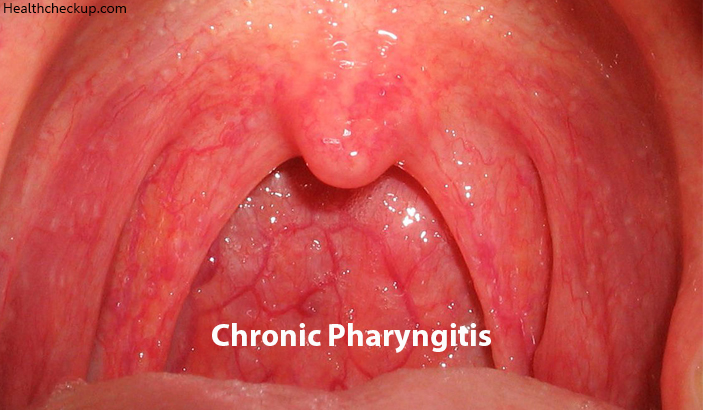Pharyngitis is a type of inflammation, most commonly caused by an upper respiratory tract infection. It may be classified as Acute or Chronic. Acute pharyngitis may be catarrhal, purulent or ulcerative, depending on the causative agent and the immune capacity of the affected individual. Chronic pharyngitis may be catarrhal, hypertrophic or atrophic.
Tonsillitis is a subtype of pharyngitis. If the inflammation includes both the tonsils and other parts of the throat, it may be called Pharyngotonsillitis. Another subclassification is Nasopharyngitis (the common cold).
The chronic inflammatory condition of the pharynx characterized by hypertrophy of mucosa, seromucinous glands, subepithelial lymphoid follicles and even the muscular coat of the pharynx.
Types of Chronic Pharyngitis
- Chronic Catarrhal Pharyngitis
- Chronic Granular Pharyngitis ( Hypertrophic )
Causes (Etiology) Of Chronic Pharyngitis
- Persistent infection in the surrounding structures of pharynx like sinus, tonsils, nose etc including dental sepsis.
- Mouth breathing exposes pharynx to air which has not been filtered, humidified and adjusted. These usually result of nasal polyp, rhinitis, turbinate hypertrophy, adenoids, tumors. It can also be due to protruded teeth or habitual mouth breathing.
- Environmental Pollution
- Faulty voice production as seen in certain professions like singers and overuse of voice. Can also occur in case of pharyngeal neurosis
- Viral: These comprise about 40–80% of all infectious cases and can be a feature of many different types of viral infections.
- Adenovirus – The most common of the viral causes. Typically the degree of neck lymph node enlargement is modest and the throat often does not appear red, although it is painful.
- Orthomyxoviridae which cause influenza – Present with rapid onset high temperature, headache and generalized ache. A sore throat may be associated.
- Infectious mononucleosis (“Glandular Fever”) caused by the Epstein Barr Virus. This may cause significant lymph gland swelling and exudative tonsillitis with marked redness and swelling of the throat. The heterophile test can be used if this is suspected.
- Herpes Simplex Virus can cause multiple mouth ulcers.
- Measles
- Common Cold: Rhinovirus, coronavirus, respiratory syncytial virus, parainfluenza virus can cause infection of the throat, ear, and lungs causing standard cold-like symptoms and often pain.
- Bacterial: The most common is Group A streptococcus, but others include Streptococcus Pneumonia, Haemophilus Influenzae, Bordetella Pertussis, Bacillus Anthracis, Corynebacterium Diphtheria, Neisseria Gonorrhoeae, Chlamydophila Pneumonia, and Mycoplasma Pneumonia.
- Fungal: Some cases of pharyngitis are caused by the fungal infection such as Candida albicans causing oral thrush.
- Non-Infectious: Pharyngitis may also be caused by mechanical, chemical or thermal irritation, for example, cold air or acid reflux. Some medications may produce pharyngitis such as pramipexole and antipsychotics.
Symptoms Of Chronic Pharyngitis
- Discomfort or pain in the throat- prominent in the morning
- Foreign body sensation ( something stuck to throat ) sensation- Patient has constant desire to clear his throat.
- Tiredness of Voice- Voice may lose quality and even crack.
- Cough- Irritable throat. Simply opening of mouth can cause retching and gagging
Throat in Chronic Pharyngitis
- Congestion of posterior wall of pharynx, engorgement of vessels, pillars may be thickened.
- Increased mucus secretion.The posterior pharyngeal wall may be studded with reddish nodules in case of Granular pharyngitis.
- Lateral pharyngeal bands may enlarge and uvula may be elongated and hypertrophied.
Diagnostic Approach
Throat swab.
It is hard to differentiate a viral and a bacterial cause of a sore throat based on symptoms alone. Thus often a throat swab is done to rule out a bacterial cause.
Pharyngitis Treatment
- Etiological factor or causative agent must be eradicated for resolution of Pharyngitis. Eg: Stop smoking, abstain from alcohol and cold, irritant food.
- Voice rest is essential
- Speech therapy where faulty voice production is seen
- Warm Saline gargles may be soothing and even relieves pain and irritation.
Medications
- Pain medication such as NSAIDs and acetaminophen (paracetamol) can help reduce the pain associated with a sore throat. Aspirin may be used in adults but is not recommended in children due to the risk of Reye syndrome.
- Viscous lidocaine relieves pain by numbing the mucus membranes.
- Antibiotics are useful if a bacterial infection is the cause of a sore throat. For viral infections, antibiotics have no effect.
- Oral analgesic solutions
Medically Reviewed By








